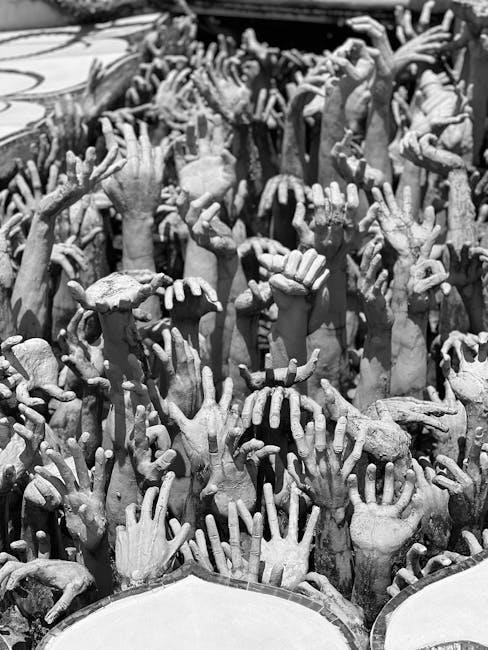The SC Religious Exemption Form allows individuals to request exemptions from immunization requirements due to sincerely held religious beliefs, providing a legal pathway for such accommodations in South Carolina.
Overview of the Form and Its Purpose

The SC Religious Exemption Form is a legal document designed to accommodate individuals seeking exemptions from mandatory immunizations or vaccinations due to deeply held religious beliefs. It serves as a formal request to waive specific health requirements in educational or workplace settings. The form is primarily intended for parents, guardians, or students in South Carolina who wish to assert their right to religious freedom. By completing and submitting the form, applicants provide a written declaration of their sincere religious objections, ensuring compliance with state laws such as Section 44-29-40 of the South Carolina Code. The document is structured to include essential details about the individual, their beliefs, and the specific exemption being requested, making it a crucial tool for upholding religious liberties in the state.
What is the SC Religious Exemption Form?
The SC Religious Exemption Form is a document enabling individuals to request exemption from immunization requirements in South Carolina based on sincerely held religious beliefs.
General Description and Purpose
The SC Religious Exemption Form is an official document designed to allow individuals in South Carolina to request exemptions from immunization requirements based on sincerely held religious beliefs. It is primarily used for childcare and K-12 students, enabling parents, guardians, or individuals in loco parentis to seek accommodations for their children. The form must be signed and notarized, ensuring its validity under state law. Its purpose is to provide a legal pathway for individuals to opt out of mandatory vaccinations while respecting their religious convictions. The form is recognized by schools, childcare facilities, and healthcare institutions in South Carolina, ensuring compliance with state immunization laws and regulations. It serves as a formal request for exemption, outlining the specific religious objections and adhering to legal standards.
Eligibility Criteria for the Exemption
Eligibility for the SC Religious Exemption Form applies to parents, guardians, or individuals in loco parentis seeking exemptions for minors based on sincerely held religious beliefs.
Who Can Apply for the Exemption
The SC Religious Exemption Form is primarily available to parents, legal guardians, or individuals acting in loco parentis of a minor. These individuals must have legal custody of the child and be responsible for making educational or medical decisions on their behalf. The exemption applies to minors seeking admission to childcare programs, kindergartens, or schools in South Carolina, whether public, private, or parochial. To qualify, the applicant must demonstrate sincerely held religious beliefs that prohibit immunization or vaccination. The form requires a notarized statement of religious objection, ensuring the request is authentic and aligns with South Carolina’s legal requirements; This exemption is not applicable to personal or philosophical objections, only to religious beliefs. Additionally, individuals seeking religious exemptions for healthcare services or vaccine mandates in South Carolina may also use this form. The exemption is typically valid until the child reaches the age of 18, unless revoked or updated.

Obtaining and Filling Out the Form
The SC Religious Exemption Form can be obtained from the South Carolina Department of Health and Environmental Control or downloaded online. To fill it out, parents or guardians must provide basic pupil information, sign the religious objection statement, and have it notarized. The form must be completed accurately, with clear statements outlining the religious beliefs opposing immunization. Once filled, it should be submitted to the appropriate school or healthcare authority, ensuring compliance with South Carolina’s legal requirements for religious exemptions.
Where to Find the Form
The South Carolina Religious Exemption Form can be obtained through the South Carolina Department of Health and Environmental Control (DHEC) or downloaded from their official website. It is also available at local county health departments and certain school districts. Additionally, the form can be accessed online in PDF format through legal document providers such as US Legal Forms. Ensure the form is downloaded from a trusted source to guarantee accuracy and compliance with state regulations. Always verify the form’s authenticity before use, as outdated versions may not be accepted. For convenience, search using keywords like “South Carolina Religious Exemption Form PDF” to locate the official document quickly and securely.
How to Fill Out the Form

Filling out the South Carolina Religious Exemption Form requires careful attention to detail to ensure compliance with state regulations. Begin by completing Section I, which includes basic pupil information such as the student’s name, date of birth, and school details. Section II involves a signed statement from the parent or guardian, outlining the sincerely held religious beliefs that prohibit immunization. The form must be notarized to validate the signature. Ensure all fields are filled accurately and legibly. Once completed, submit the form to the appropriate authority, such as the school or healthcare provider. Keep a copy for personal records. Properly filling out the form ensures the exemption is processed efficiently and in accordance with South Carolina law.

Submission Guidelines
Submit the completed and notarized form to the school or healthcare provider. Ensure all sections are filled accurately and the form is signed by the appropriate authority.
Where and When to Submit the Form
The completed and notarized SC Religious Exemption Form must be submitted to the school, healthcare provider, or relevant institution requiring immunization records. Ensure the form is delivered before the vaccination deadline to avoid delays. Submitting early is recommended to allow time for processing. The form should be handed in person or mailed to the appropriate office, depending on the organization’s requirements. Keep a copy for personal records. Late submissions may result in temporary exclusion from programs until the exemption is processed. Ensure all sections are properly filled and notarized to avoid rejection. Timely submission guarantees compliance with South Carolina’s immunization exemption policies.

Legal Considerations
The SC Religious Exemption Form is governed by South Carolina state laws, ensuring compliance with Section 44-29-40 of the South Carolina Code of Laws and federal Religious Freedom Restoration Act (RFRA), protecting individuals’ rights to exemptions based on sincerely held religious beliefs.
State and Federal Laws Governing the Exemption
The South Carolina Religious Exemption Form is primarily governed by Section 44-29-40 of the South Carolina Code of Laws and Department of Health and Environmental Control Regulation 61-8. These laws allow exemptions from immunization requirements for individuals with sincerely held religious beliefs. Federally, the Religious Freedom Restoration Act (RFRA) also protects individuals’ rights to request exemptions based on religious convictions. Together, these state and federal laws ensure that individuals in South Carolina can legally opt out of immunizations due to religious objections, provided the exemption is properly documented and submitted.
Special Cases and Exceptions
The SC Religious Exemption Form accommodates temporary exemptions for delays in immunizations and provides an appeals process for denied requests, ensuring legal protections for all cases.
Handling Temporary Exemptions and Denials
Temporary exemptions in South Carolina are valid for 30 days, addressing delays in securing immunizations or documentation. If an exemption is denied, applicants may appeal by providing additional documentation or clarification on their religious beliefs. The process ensures fairness and compliance with state laws. Temporary exemptions are issued once and must be renewed after expiration. Denials are typically due to insufficient evidence of sincerely held religious beliefs. Applicants have the right to reapply with further supporting details. This system balances public health requirements with individual religious freedoms, ensuring all cases are handled with legal and ethical consideration.
